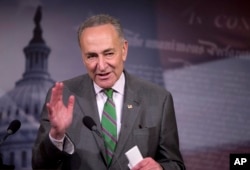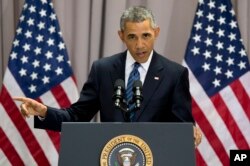Missouri Democratic Senator Claire McCaskill said she does not believe she and other uncommitted U.S. lawmakers feel under any pressure from either side as Congress weighs its support of the Iran nuclear agreement.
President Barack Obama, in a Sunday broadcast interview, warned congressional rejection of the deal would make the central goal of keeping Iran from obtaining nuclear weapons harder to achieve.
McCaskill, who has not yet committed to support or reject the agreement, said she is reaching out to the diplomats of countries holding Iranian assets to see if they will continue to respect international sanctions if the U.S. Congress rejects the deal.
Where money is held
"That money is held primarily in India, China, South Korea [and] Japan. So, I’m on the phone to those countries, those embassies, those ambassadors, asking them the question, ‘What will you do if the United States walks away? Will Iran get this money anyway?’ " McCaskill said.
If these countries maintain sanctions should the Congress reject the agreement, would she be inclined to oppose it?
"It’s not a perfect deal, obviously. We don’t trust Iran, but I think too many people are judging this deal against the status quo, not what the new situation would be on the world stage," the senator said.
"Remember, the world is united in this deal, so it’s going to have to be a status quo where the rest of the world also stays united or the sanctions regime will just fall apart," she added.
Last week a prominent member of her party, New York Senator Chuck Schumer, announced his opposition, warning the risk Tehran will not moderate and pursue "its nefarious goals" is too great.
When asked if she feels pressured to make a decision, either by proponents of the nuclear agreement, or those, such as Schumer, who oppose it, McCaskill said, "I don’t think any of us feel pressured, either by Chuck Schumer’s rejection of this deal or the president’s full-throated support.
'Doing our homework'
"I hope my colleagues are doing what I’m doing and that is doing our homework. One of the things that was most disappointing was the (majority) Republicans insisted on 60 days to review this deal," she said.
"It appeared to me that most of them made their minds up in five minutes, and so I think this is one where the heightened rhetoric on both sides is not always helpful and I hope that more senators keep their blinders on and do their homework and figure out which way do we secure Israel and secure our country," she said.
In an interview recorded Friday and broadcast Sunday on CNN’s Fareed Zakaria GPS, President Obama said a majority of Americans in surveys oppose the deal because they don’t have all the facts about what he called a complicated agreement with a country that chants "Death to America."
But, he added, those who know most about the central challenge of keeping Iran from acquiring nuclear weapons overwhelmingly support it.
Obama said congressional opponents of the agreement have a lot in common with the hardliners in Iran who want to maintain the status quo.
He said those who have announced their opposition before reading the agreement are not interested in the substance of the issue, but the politics of it.
Harder to reach goal
And, he warned congressional rejection would make it harder to achieve the central goal of keeping Iran from acquiring nuclear weapons.
Obama said the international unity achieved would fray, not just on sanctions, but with respect to world attitudes about U.S. leadership and how they gauge who’s at fault in the dispute between the U.S. and Iran.
I.S. lawmakers are expected to vote next month on whether to disapprove of the comprehensive international nuclear agreement with Iran.
Obama has threatened to veto such a vote requiring both houses of Congress to muster a two-thirds vote to override the veto.
Saturday, nearly 30 American scientists, including Nobel laureates, issued a two-page letter praising the Iran deal calling it innovative and stringent.






